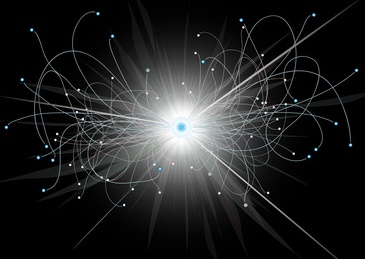 |
Lecture:
|
Time: Monday and Wednesday, 4:30 - 6:20 pm
Location: Wean Hall 5302
|
Office Hours:
|
Time: Wednesday and Friday, 3:00 - 4:00 pm
Location: Scaife Hall 319
|
 |
Course Description:
|
This course is intended for engineering students. The course will cover statistical thermodynamics and advanced classical thermodynamics. In traditional Mechanical Engineering courses on thermodynamics, we learn to apply the thermodynamic laws and identities to macroscopic systems. Often, it is not discussed how the microscopic behavior is related to the macroscopic properties. In this course, we will try to bridge this gap. Students will be introduced to the statistics of thermal physics that relate probabilities at the microscales to the properties at the macroscale. Energy storage mechanisms at the microscales, governed by quantum mechanics, will be utilized to derive the expressions for macroscopic properties such as internal energy, specific heat, entropy etc. These concepts will then be utilized to understand second law of thermodynamics applied to energy conversion, multi-component fluids, and multi-phase systems.
|
|
Prerequisites:
|
Undergraduate Thermodynamics, or equivalent
|
|
Textbook:
|
- Introduction to Thermal Physics, Daniel V. Schroeder (Addison-Wesley, 1999)
|
|
Grading:
|
- Homeworks (35%)
- Project (15%)
- Midterm exam 1 (15%)
- Midterm exam 2 (15%)
- Final exam (20%)
|
|
Syllabus:
|
---------------------------------------------------------------------
Aug 26 - Dec 06 (15 weeks)
|
|
|
Aug 26 - Aug 30
|
Energy, Heat, and Work
Thermal equilibrium and temperature, microscopic model of an ideal gas, equipartition of energy, energy storage mechanisms and degrees of freedom, heat, work and enthalpy
|
|
Sep 02
|
Labor day
|
|
Sep 04
|
Probability and Multiplicity
Probability and multiplicity of coin flipping, multiplicity and energy states for Einstein solid, multiplicity of interactive systems, sharpness of multiplicity function
|
|
Sep 09 - Sep 13
|
Entropy and Second Law of Thermodynamics
Entropy a function of multiplicity, multiplicity and entropy of an ideal gas, introduction to the 2nd law, entropy of expansion and mixing
|
|
Sep 16 - Sep 20
|
Entropy and Equilibrium
Thermal and mechanical equilibria, temperature and pressure expressed in entropy, macroscopic view of entropy, direction of heat flow
|
|
Sep 23
|
Diffusive Equilibrium and Review for Exam 1
Chemical potential, introduction of the Thermodynamic Identity, sharpness of multiplicity function for N microsystems
|
|
Sep 25
|
Midterm Exam 1
|
|
Sep 30 - Oct 04
|
Thermodynamics and Boltzmann Statistics
Introduction to molecular and subatomic energy storage mechanisms, the Boltzmann factor, probability of finding the system in a microstate, microstate population distributions, calculation of average quantities from statistical distributions
|
|
Oct 07 - Oct 11
|
The Partition Function - Part 1
Partition function calculations, mean energy and specific heat from partition function, fluctuations about the mean, partition function for composite systems
|
|
Oct 14 - Oct 18
|
The Partition Function - Part 2
Partition function for an ideal gas, distribution of rotational, translational, and vibrational energies, partition function and free energy, Equipartition Theorem derivation using Boltzmann distribution
|
Oct 21 - Oct 25
|
Thermodynamics and Quantum Statistics
Breakdown of Boltmann statistics for dense systems, introduction to Bosons and Fermions, the Gibbs factor, grand partition function, conditions for bosons and fermions, Fermi-Dirac distribution, Bose-Einstein distribution, comparison with Boltzmann distribution
|
|
Oct 28 - Nov 01
|
Conclusion of Quantum Statistics and Review for Exam 2
|
|
Nov 04
|
Thermodynamic Cycles
Ideal and real heat engine and refrigeration cycles, flow of heat and entropy, entropy limit on efficiency, effect of working fluid properties on efficiency, throttling process from microscopic perspective, mechanisms of entropy generation
|
|
Nov 06
|
Midterm Exam 2
|
|
Nov 11 - Nov 15
|
Free Energy and Chemical Thermodynamics
Free energy and available work, free energy as a force towards equilibrium, thermodynamic identities, Maxwell relations
|
|
Nov 18 - Nov 22
|
Phase Transformations and Dilute Solutions - Part 1
Phase diagrams, critical point, stability, the Clausius-Clapeyron relation, the van der Waals model
|
|
Nov 25
|
Phase Transformations and Dilute Solutions - Part 2
Phase transformations of mixtures, solvent and solute chemical potentials, Gibbs phase rule, osmotic pressure, boiling and freezing points
|
|
Nov 27 - Nov 29
|
Thanksgiving break
|
|
Dec 02
|
Final Exam Review
|
|
Dec 04
|
Project Presentations
|
|
Dec 12
|
Final Exam
Time: 5:30 - 8:30 PM, Location: Wean Hall (WEH) 5421
|
---------------------------------------------------------------------
|
 |
|
